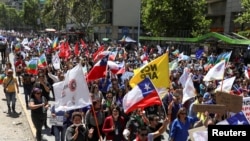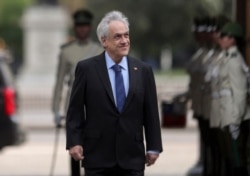Chilean President Sebastian Pinera on Tuesday asked lawmakers to allow troops back on the streets to defend key public infrastructure, even as a human rights group reported "grave" abuses by security forces over five weeks of sometimes violent riots.
The continuing protests in Chile over inequality and a shortfall in some social services have left at least 26 dead and thousands injured. They have also hobbled the capital's public transport system, once the envy of Latin America, and caused billions in losses for private business.
Riots have erupted in countries across Latin America, including Colombia, Ecuador and Bolivia in recent weeks as regional unrest has spiraled into violence and demands for broad-based reforms.
Pinera sent a bill to Congress Tuesday morning to allow the military to protect transmission lines, electric plants, airports, hospitals and other public infrastructure in order to assure "basic services."
He said the move would "free up the police force ... to protect the security of our citizens."
Pinera's announcement came shortly after international rights group Human Rights Watch said in a report that police had brutally beat protesters, shot teargas cartridges directly at them, and ran over some with official vehicles or motorcycles.
"There are hundreds of worrying reports of excessive force on the streets and abuse of detainees," said Jose Miguel Vivanco, director of Human Rights Watch's Americas division, after meeting with Pinera on Tuesday.
The group stopped short of alleging the abuses had been systematic, but its conclusions were in line with a report last week by Amnesty International on the seriousness of many violations. More than 200 Chileans have suffered severe eye injuries alone in clashes with police using rubber bullets.
Both Human Rights Watch and Amnesty International have recommended an immediate overhaul of police protocols and accountability measures to address the mounting allegations of abuse.
Police and military officials have said any cases of alleged abuse are under investigation by civilian courts.
New clashes
Roadblocks snarled traffic around the Chilean capital Santiago on Tuesday around midday, as protesters set up burning barricades on major streets and highways around the city.
Police used water cannons to disperse protesters in front of the La Moneda presidential palace shortly after Pinera's speech there. Many took to the city's main boulevard afterward, bringing traffic to a standstill.
"This never ends," Rosa Olarce, a pharmacy worker, told Reuters as she waited for a bus. "We'll see what comes of it."
Pinera in his speech Tuesday morning ticked off a list of reforms, from boosting the minimum wage to slashing the prices of medicines and public transportation, aimed at quelling the protests.
The country's normally fractious political parties have also agreed to work together on a new constitution.
However, protests continue, in smaller numbers but with intense violence at their fringes, driven by mistrust that politicians will keep their promises to bring significant change, and enduring fury over the police handling of demonstrators.






